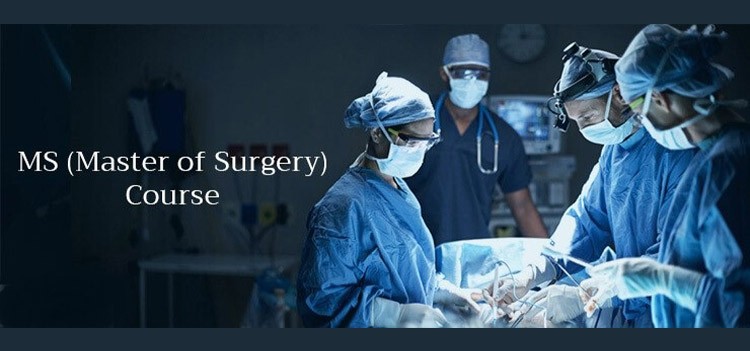Few lines about Master of Surgery (MS)
Master of Surgery (MS) is an advanced programme which is mandatory for students who seek careers as surgeons in India. The course comprises various specialisations varying according to human anatomy. The specialisation course will comprise the details pertaining to that particular human body part to enable students to understand the different diseases and surgical methods to treat them. The MS course is highly advanced and requires all candidates to pass MBBS degree and qualify NEET-PG exam for getting admissions to MS Programmes.
Popular specialisations in Master of Surgery (MS)
There are several specialisations available in MS courses according to human anatomy. The MBBS students can choose from a wide range of specialisations that suits their interests. Let’s try to understand some of the popular specialisations among the MBBS students
MS in General Surgery
The MS in General Surgery typically relates to the surgeries that are involved in internal parts of the human body. They are mostly related to abdominal parts of the human body. They specialise in conducting surgeries in stomach, intestine, liver, rectum, etc. They are also responsible to conduct surgeries in the patients suffering from various gastrointestinal problems like appendix, hermaphrodites. They are also responsible to conduct liver transplants, etc. The general surgeons are educated and trained in the diagnosis of preoperative, operative and postoperative management of patient care.
The general surgeons are trained to provide surgical care for the patients completely, that includes making a diagnosis, preoperative, operative and post-operative management of the patient and also surgical treatment. The general surgery tends to be varied specially, where the activities of a general surgeon involve time in the operating room, office, emergency department and the intensive care unit (ICU).
MS in Obstetrics & Gynaecology
The MS in Obstetrics & Gynaecology surgeons are mainly responsible to conduct surgeries related to female reproductive organs. They perform caesareans in delivery, they perform laparoscopic surgeries, In Vitro Fertilisation (IVF) surgeries, they are also responsible to conduct surgeries related to uterus, ovaries, etc.
An obstetrician and gynaecologist is a physician who specializes in the surgical care of women and their children during pregnancy, childbirth, puerperium and postnatal care. They also perform regular ultrasounds during pregnancy to determine the health of the foetus, identify any complications and know the gestational period of the foetus. They are also responsible to identify if there are any high-risk factors in women during pregnancy, delivery and later and ensure that they are treated on time to prevent complications during the pregnancy and delivery. An obstetrician and gynaecologist who specializes in the medical care of women and in health of the female reproductive system. They also deal with pap smear, infections of vaginal and uterine origin, fertility problems, contraception, tubal ligations and hysterectomy.
MS in Orthopaedics
The MS in Orthopaedics surgeons perform surgeries that are related to human bones. They perform bone correction surgeries, bone marrow transplantation, they also treat the fractures by providing steel implants for the patients who met with an accident.
The Orthopaedic surgeons specialise in surgical treatments for problems caused by disease and injury (trauma) in the bones, joints and other structures involved in making the body move. Most of the orthopaedic surgeons specialise in particular procedures or areas of the body. Some surgeons also have specialist experience in certain diseases.
MS Otolaryngology
Otolaryngology is the medical and surgical specialty concerned with the diagnosis, management and treatment of diseases and disorders of the ear, nose, throat (ENT) and related structures of the head and neck, including the sinuses, larynx (voice box), oral cavity and upper pharynx (mouth and throat). Subspecialty areas within otolaryngology include paediatric otolaryngology (children), otology/neurotology (ears, balance and tinnitus), allergy, facial plastic and reconstructive surgery, head and neck, laryngology (throat) and rhinology (nose). Some otolaryngologists limit their practices to one or more of these seven areas. Otolaryngology is commonly called ENT.
MS Ophthalmology
Ophthalmology is a branch of medicine dealing with the diagnosis, treatment and prevention of diseases of the eye and visual system. The eye, its surrounding structures and the visual system can be affected by a number of clinical conditions. Ophthalmology involves diagnosis and therapy of such conditions, along with microsurgery. Eye health services are becoming more and more important as the UK population ages. An ageing population means there are more and more incidences of age-related diseases of the eye, such as age-related macular degeneration. These eye diseases can be successfully treated if caught early and can be managed effectively with existing treatments and medicines.
The ophthalmologist is a medical or osteopathic doctor who specializes in eye and vision care. Ophthalmologists differ from optometrists and opticians in their levels of training and in what they can diagnose and treat. Each member of the ophthalmic team plays an important role in providing eye care, but many people confuse the different providers and their roles in maintaining the eye health. The levels of training and expertise—and what they are allowed to do —are the major difference between the types of eye care provider.
Conclusion
The MS doctors are in great demand due to their skills and expertise. The MBBS students who are interested to pursue postgraduate studies can choose between Doctor of Medicine (MD) and Master of Surgery (MS). The students who are interested in surgical techniques and surgical skills can choose to join the Master of Surgery (MS). There are different specialisations in the Master of Surgery (MS) and students can choose their desired specialisations in the master of surgery (MS). The students with the passion of serving the patients can choose to join the Master of Surgery (MS) and serve society.






